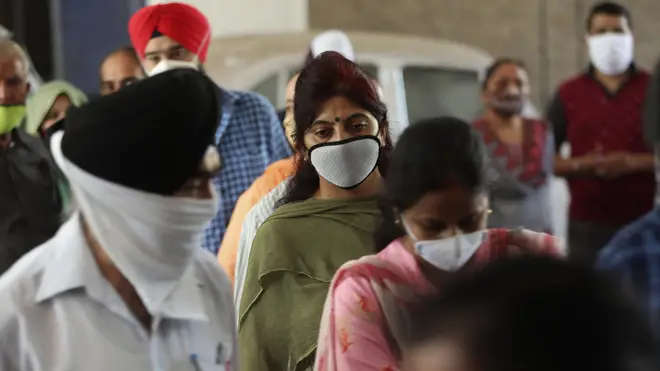
Tom Swarbrick 4pm - 6pm
7 September 2020, 14:03 | Updated: 7 September 2020, 14:06

India has surpassed Brazil to become the second worst-hit nation by coronavirus in the world.
The country's health ministry recorded 90,802 new cases of COVID-19 on Monday, bringing the national total to more than 4.2 million people.
This means it has now overtaken Brazil - which has 4.1 million cases - and is second only to the United States with 6.2 million.
A further 1,016 people also died with the virus in India on Monday, bringing the total to 71,642 - the third highest national toll.
READ MORE: Hancock warns over young people spreading Covid-19
Despite recording the world's largest daily increases in almost a month, with the virus now spreading through smaller towns and villages, the Indian government is pressing ahead with relaxing measures to save the economy.
It comes amid a struggle with having the fastest-growing coronavirus outbreak in the world, but also the fastest shrinking economy in comparison to other major countries.

George Osborne on government's coronavirus response and economic recovery
On Monday, the Delhi Metro also reopened for the first time in five months, only allowing asymptomatic people to board with masks, social distancing, and temperature checks.
The metro, which is India's largest rapid transport system, would carry an average of 2.6 million people daily at its height usage before the pandemic.
New Delhi was initially hard hit by the virus, but aggressive screening led to thoughts the city may have been turning the tide.
But a recent surge in new cases and deaths have come as the city begins to reopen, sparking fears that resuming metro services would just make things worse.
READ MORE: 'No social distancing' at Heathrow during chaotic arrival
More than half of India's active cases are currently seen in Andhra Pradesh, Tamil Nadu, Karnataka, Maharashtra and Uttar Pradesh, India's most populous state - but surges are now returning to areas that had previously managed to slow the outbreak.
This also highlights the country's strategy of relying on cheap rapid tests that have allowed the country to test more than a million people daily, but are also less precise and more likely to miss infected people, according to Dr Gagandeep Kang, an infectious diseases expert of Christian Medical College at Vellore in southern India.
India also says its recovery rate is 77.3 per cent and the case fatality rate has declined to around 1.72 per cent.